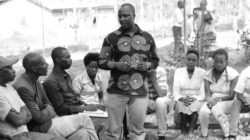While there has been great progress made in recovering from the devastating 1994 genocide against Tutsis, a new study from one of Rwanda’s leading peacebuilding organizations found that the country is still in need of more societal healing initiatives to help citizens deal with a painful past and to build a sustainable peace for the future.
The Never Again Rwanda study, entitled Societal Healing in Rwanda: A mapping of actors and approaches, plots out the initiatives of 45 government, international and national organizations that carry out healing work across the country, as well as work in the fields of reconciliation and peacebuilding. The study, which will be validated by key stakeholders on Nov. 3, found that with regard to societal healing in particular, there is a need for more initiatives to address psychological wounds that resulted from the 1994 genocide perpetrated against Tutsis and its consequences, as well as wounds that occurred as a result of discriminatory government policies and structural violence in Rwanda prior to 1994.
Prof. Naasson Munyandamutsa, Country Director of Never Again Rwanda, said that the report aims to shed light on the existing healing, reconciliation and peacebuilding initiatives that have taken place in Rwanda since the 1994 genocide perpetrated against Tutsis and to provoke discussion and debate about healing practices in the country.
“All societies that have emerged from extreme violence have no choice but to find adequate strategies to tend to both the visible and invisible wounds caused by atrocities,” Prof. Munyandamutsa said, adding that because genocide is a crime that affects the society as a whole, it is very important for Rwandan society to examine how it will continue to fulfill its social responsibility to tend to invisible wounds. “The report will give a snapshop of this reality and will open the doors for new perspectives.”
Of Rwandans in need of healing, the report notes that women and youth are groups that are often difficult to reach through healing interventions – whether in governmental or non-governmental efforts – because of societal stigma that prevent them from disclosing their pain. For instance, rape survivors and children born of rape were cited in the report as groups that are stigmatized and are prevented from accessing help due to the shame that they feel about the trauma they endured, or negative stereotypes associated with their identity.
The Never Again Rwanda report also found that time is a key element in healing, and that while some Rwandans have been able to recover from psychological wounds, the time it takes can greatly vary from one person to the next, with some people requiring a lifetime to heal. One of the experts interviewed for the study remarked: “We must understand that healing is a process that takes time. Do not be discouraged by the magnitude of the tragedy that befell Rwanda. In each human being there is light that never dies.”
Despite these challenges, the study also contains reason for optimism. Group dialogue was found to be a commonly used and appropriate technique for Rwanda’s unique post-genocide context: when effective facilitation of these groups is conducted in spaces where Rwandans feel safe to discuss their problems, they can be a transformative technique in healing work. Dialogue groups were found to help to address challenges to peace, by building understanding between people of diverse backgrounds and fostering the development of healthy relationships, even among survivors and former perpetrators of genocide. The report notes that a key element in making these dialogue groups successful was the use of a trained facilitator, with strong analytical and leadership skills
The study is a product of Never Again Rwanda’s Societal Healing and Participatory Governance for Peace in Rwanda program, a four year program funded by the Embassy of Sweden in Rwanda. The program seeks to contribute to the consolidation of a peaceful and inclusive Rwandan society, enabled to overcome the wounds of the past and to peacefully manage conflicts and diversity, as well as empowered to influence programs and policies responsive to citizen priorities. The mapping study will be used as a tool – along with key ideas that surface from ongoing debates among stakeholders – to guide the implementation of the societal healing programs that NAR will be carrying out after the program officially launches in early November.
Prof. Munyandamutsa said that the most important part of the societal healing component of the program is the message that it will send in Rwandan Society.
“Never Again Rwanda will not be able to cover the whole society with its program, but we want to testify that it is possible, talking from experience,” Munyandamutsa said. “We want to show that healing is a need, a very important need, and we want to show that it links to different phenomenon in the society – notably peace and stability.”
The mapping report contributes to a growing body of research in the domain of healing in Rwanda and will serve as a valuable resource, not only to Never Again Rwanda, but to the numerous organizations that conduct healing work throughout the country, as well as organizations taking on new healing projects. Once validated in the Nov. 3rd Stakeholder’s Meeting, the full report will be made available on our Research page.


